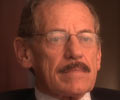- People
- Ron Brownstein
- Orson Swindle
- Victoria Clarke
- Robert Timberg
- Mark Salter
- Mark McKinnon
- Ron Kaufman
- John Weaver
- Lindsey Graham
- Related Link
- The Curious Mind of John McCain
A 2008 Washington Post profile
Ron Brownstein The National Journal; author, The Second Civil War

John McCain is not a politician of grand strategic plan; John McCain is a fighter pilot in the world of politics who lives by his instincts. He is not someone who it is easy to chart out a course for and expect him to stay on it.
He can be told: "OK, our strategic plan here is, we're going to get right with the right. We're going to make you more acceptable to conservatives. We're going to emphasize the issues where you do overlap with the Republican mainstream. And we're going to focus on all of that to make you someone who is more acceptable than you were in 2000 to core Republicans."
But in McCain's own vision of himself as a politician, honor -- and this certainly speaks to his family background in the military -- is the value that he treasures above all. The idea that he would walk away from his convictions where he has in the past broken from the party, I think seemed to him anathema.
Now, he did adjust. In '07, the overall immigration bill moved to the right from '05 and '06. ... McCain was involved in some alterations along the way that tugged the thing to the right, but fundamentally he stuck with it at a time when the conservative opposition to it was enormously amplified from '05 and '06. ... But McCain did stick with it, at great cost to his campaign. I mean, ultimately, that was an enormous problem for him.
If you look at what happened to him in the spring of '07, he was kind of left betwixt and between. His unwavering support for the war drove away moderates and independents who had been the key to his run in 2000, and his willingness to continue working with [Sen.] Ted Kennedy [D-Mass.] on immigration reform drove away the base. He was left without a constituency. He's eroded from both ends.
Is that a calculation on his part, where he is on immigration and where he is on the war? Or, as you say, is it that honor?
There is no conceivable political calculation that would put you in those two places at the same time. ... It made sense only in the sense of McCain's vision of his own brand as someone who is a maverick, who is a pragmatist, who is an independent.
Orson Swindle McCain adviser; prisoner of war, 1966-'73
 Read the full interview >
Read the full interview >
He was ... worried about his dad hearing about him having [made a confession after being tortured], that it really bothered him, and that later he and his father had the conversation, and his father says to him, "You did the best you could."
I can understand that. John frequently says: "The essence of why we're here is to devote ourselves to a cause bigger than we are, something bigger than just me. Me's not worth a damn. It's something bigger than me; it's something bigger than you; it's something that we can accomplish, that moves the ball down the field in a positive sense." I feared embarrassing my son, who didn't even know me. I feared embarrassing my family. I feared embarrassing my Marine [Corps], which was sort of like my family. I feared embarrassing or hurting my country.
... It's about honor. It's about those obligations, spoken or sworn to, that you just don't do things like that. So yeah, I can understand his dad saying, "You did the best you could."
Victoria Clarke Former McCain press secretary, 1983-'89

Philosophically, how does he fit into the spectrum of conservatives from [Sen. Barry] Goldwater [R-Ariz.] to [President Ronald] Reagan to [President George W.] Bush?
... If pushed, he would say, I think, "I'm a Reagan conservative," and he'd go down through his list of social issues on which he'd been very consistent. And then he'd say, "Sometimes I feel I have to oppose them," but he considered himself then, and I think still does today, a pretty solid, conservative, Reagan-like Republican.
When does he take on this reputation of being a maverick?
I think it started in 1983 when he decided to oppose the administration with troops in Beirut. It was so out of left field for so many people. It really took a certain amount of political courage to do it. So I think it actually started then.
Now, he didn't go out looking for more fights like that for a few years. Nothing seemed to happen that would put him in that mode again. But he was constantly surprising people. He was surprising defense contractors who thought he was going to be very supportive of them once he was in Congress. So it was a bit of an evolutionary thing, but I think it started that far back.
What is it in him that creates this style and allows other people to see him as a maverick?
I can be the armchair shrink and say it goes back to his relationship with his father and not wanting to be in the Navy and not wanting to go in the Naval Academy. ... I think there was a little bit of that. I think from a very young age he was a little bit of a rebel. He didn't want to do what people told him he had to do. If you tell John McCain he has to do something, right away the back goes up a little bit, and you can see the teeth clench. And I think it's been that way since he was quite young.
Robert Timberg Author, John McCain: An American Odyssey and The Nightingale's Song

I think [Sen. McCain] feels like you join a political party because, on most things, the members of that party believe as you believe. I don't think he ever saw that as meaning that you had to remain in lockstep on every issue. I think when he first was elected to Congress, he always felt that, when he felt he needed to, he would go his own way. Certainly with McCain-Feingold, with the campaign finance reform bill, he did. ...
... He seemed to make his bread and butter there for awhile as being Mr. Outsider, though.
... I think he thinks that's what a senator does: You see what needs to be done, and you try to do it or make it happen. ... One of these other things that Republicans get all exercised about with McCain is that he crosses over the aisle. He'll sponsor legislation with [Russ] Feingold [D-Wisc.] or with Ted Kennedy or with, god forbid, Hillary Clinton [D-N.Y.].
Mark Salter Senior adviser to John McCain
 Read the full interview >
Read the full interview >
There was a war that was being horribly mismanaged, and John McCain was the chief critic of the management of that war. ...
Now, what has happened in the 14 months since the counterinsurgency commenced? A remarkable change in Iraq. You can't ignore that. That should be to John McCain's enormous credit, because at the time he called for this change that produced this progress, he was criticized by Republicans, criticized by Democrats, criticized by the press, criticized in think tanks. But he was right. He was right. It was a moment of astonishing clarity, good judgment and courage. I don't think anybody else running for president this year has quite such an example to point to.
Were there people on the staff who were saying, ... "Don't do it"?
You bet. Remember, the country had had it with this war. And it was particularly acute in New Hampshire; I think almost all Republicans in New Hampshire in the midterm elections in 2006 were defeated. The war was extremely unpopular. We picked that up in the polling; we can read a poll. And plenty of us thought, "You've got to get out from under this thing; it will kill you." Absolutely not.
Wouldn't move.
No, because he knew it was the last chance we had to stop a horrific chain of events.
But he's going to have the president tied around his neck in this incredibly unpopular war.
He puts this country first; that's the code that he has. There are occasions when you have to sacrifice your interests for your country's interests. I don't think he could live with the shame of doing otherwise; I just don't. It's an impressive thing to see from time to time.
Mark McKinnon Media adviser, McCain campaign, 2007-'08; media adviser, Bush re-election campaign

When it comes to any issue, Sen. McCain doesn't poll it. [Iraq] is something he feels strongly about, and there's nobody that knows those issues better than Sen. McCain when it comes to national security and Iraq.
Presumably inside the campaign, there were those who were polling, who were saying, "This war's not going well, Senator. Don't get so out front [on it]."
Oh yeah. ... I can tell you that there were plenty of voices, both on Iraq and immigration, that were saying, "Stay away, it's political suicide."
What's he like at that moment?
He's tough. He's just tough, and tough in just a very battened-down way. I mean, he's just an immoveable object when it comes to issues like that. There's no discussion. It's just, "This is the way it's going to be."
Is it physically palpable?
Just in that he kind of locks down, clenches his jaw, you know? You can kind of see the old warrior in him.
Ron Kaufman Adviser, Romney campaign

Some people say McCain's message has changed a lot because he's got to win Reagan Democrats, he's got to win the Hispanic vote or pieces of this pie different than from what Bush had won. ...
I'd have to humbly disagree with that. I think that McCain has been consistent as the guy inside who's not afraid to fight for what he believes in to bring change. Circumstances change, the climate you're operating in changes, the fight for president is different than the fight on the floor of the Senate for an issue, and you have to respond to those changes. But the basic core of who John McCain is pretty well branded on the American people, and I think it's a real advantage for John McCain. ...
There's a difference between a core value and thinking about an issue. You can change your mind on an issue because you get new ideas, new thoughts, new information. The American public not only expects that, they want that. ... It's perfectly acceptable to American voters, in my opinion, to change your direction on an issue or two as long as they believe it's within the bounds of your core values. Ronald Reagan changed his mind on a lot of things. He, quite frankly, raised taxes something like 37 times. But people believed what he did was well within the bounds of the core values he brought to the presidency, and that's the key. ...
The core value of John McCain really is not that much different than the core value of Ronald Reagan or George Herbert Walker Bush or George W. He is a conservative figure who believes very deeply that the answers aren't [provided] by bigger government, that taxing more doesn't do anything but hurt the economy, that [opposition to] abortion is a very important part of the moral fiber of our country, ... that you need a strong defense, you can't cut and run from what's going on in the world. All those are very much the same.
Having said that, how you approach those issues, how you approach changing government and making new policy is somewhat different for each of those men. ... If he tried to run as Ronald Reagan or George Herbert Walker Bush, or George W. Bush, he would lose.
How does he fit into the conservative heart and soul of the Republican Party, from Goldwater really leading to Reagan to George Bush 43?
... It's a good question. John McCain has Barry Goldwater's [Senate] seat, and while some candidates, maybe us [in the Romney campaign] a little bit, try to make him less a conservative than he really is, the truth is John McCain is at core a very conservative person, has been all his life. You can't serve this country like he served his country, you can't go through what he went through in Vietnam if you don't have a belief in yourself and an understanding what you believe in. I think without that kind of belief, you don't survive all that.
So he's, at [his] core, a definite Goldwater/Reagan/Bush Republican. Yes, he has differences. The truth is a lot of the reasons he got in trouble with the conservatives is that he felt the conservatives had drifted off those values. The best example of that, of course, is spending. He is the number one person in the Senate fighting earmarks. It is impressive that, I think, he's the only U.S. senator never to have an earmark. Very impressive thing that he felt his principles were more important than perhaps getting and currying favor with his constituents by doing earmarks. And I think it says a whole bunch about John McCain.
John Weaver McCain chief political adviser, 1997-'07
 Read the full interview >
Read the full interview >
The torture amendment -- torture is an issue that John McCain, of course, feels very personally.
That struck, I think, the rawest nerve with him of any issue that I saw in my 12 years of being associated with John in an intimate manner.
But it was a very tough fight. The White House was unyielding. McCain had the moral high ground. But we had to work like hell, like hell, to move that through the Senate. And the negotiations with the White House ranged from the bizarre to angry. And it was a tough situation.
And when [Vice President Dick] Cheney comes in [with] his full-court press, is this John McCain at his finest?
You could say that. You could say that about maybe the immigration issue. But certainly he rose to the occasion, and he took the vice president on, who at that point was at the peak of his power at the White House and with the Republicans in the Senate. I think McCain called negotiating with Cheney akin to negotiating banking reform with Bonnie and Clyde -- just not something that's really doable. Ultimately, the president saw that and then moved to, oddly enough, make [White House Counsel] Harriet Miers the negotiator, and that didn't work, and then it moved to the national security director.
Then there's the victory, and there's a famous shot of Bush and McCain shaking hands in the Oval Office. But then the signing statement surfaces. How does he take that?
He did not take that well, on multiple grounds. Again, getting back to honor, it's not an honorable thing to negotiate an agreement in an intense way, to have a very public coming together as the president and John did in the Oval Office, and then for the president to sign the bill in a very public ceremony, and then to issue a statement or a letter that undercut much of the bill. I think it got to the core thing about McCain, which is honor. Congress doesn't like to be treated that way, and that was part of it, but it really had to do about honor.
Lindsey Graham Senator (R-S.C.)
 Read the full interview >
Read the full interview >
The detainee debate was one of his finer moments, I thought, because the people that were talking about, some of them for sure would kill us all if they could. And I think John's point was, it's not about them, it's about us; that when we capture them, the attention is focused on us. And this is an ideological war. ... You're going to win it by showcasing values, and the values that we have to offer the world is a system that does not cut your head off, a system based on evidence gathering, based on the ability of the accused to confront their accuser, the ability to render verdicts not based on prejudice or bigotry, but based on law. ...
And he knows. I mean, he's lived this. He's been a military officer. He's been a prisoner of war. He knows where this ends, that if we start cutting legal corners and we start engaging in interrogation techniques that align us more with our enemy and less with who we want to be, that it catches up to us in the end.
And that's what I like most about John, the ability to look over the horizon. ... In 2006, we lost the election, the House and the Senate. Everybody was running for the exit signs. There were a series of proposals by Republicans to put timetables on our presence in Iraq and to begin to withdraw, because the conventional wisdom was the Republicans lost in 2006 because of the war.
Well, John, for about four years, saw the war in a different fashion. He really does mean it when he says, "I'd rather lose an election than a war," because he understands what follows. If Iraq goes badly, if Iraq disintegrates into three different countries, the whole region is drawn in to the problems of Iraq in a way that makes it much more difficult to deal with, and we're a lot less safe. ...
I have been in so many scrapes with John, whether it be detainee policy, campaign finance reform, the Gang of 14 or immigration and the war. What allowed John to go from all of those issues to being the nominee [is] just a sense of purpose and a belief in your position, and a core belief [that] this is the best for the country. And those beliefs are tested the most when you argue with your friends. The easiest thing in politics is to beat on your political foes, because there's a reward from your base. The hardest thing -- ask [Sen.] Joe Lieberman [I-Conn.] -- in politics is to tell that base of yours for many years, "I can't help you here."